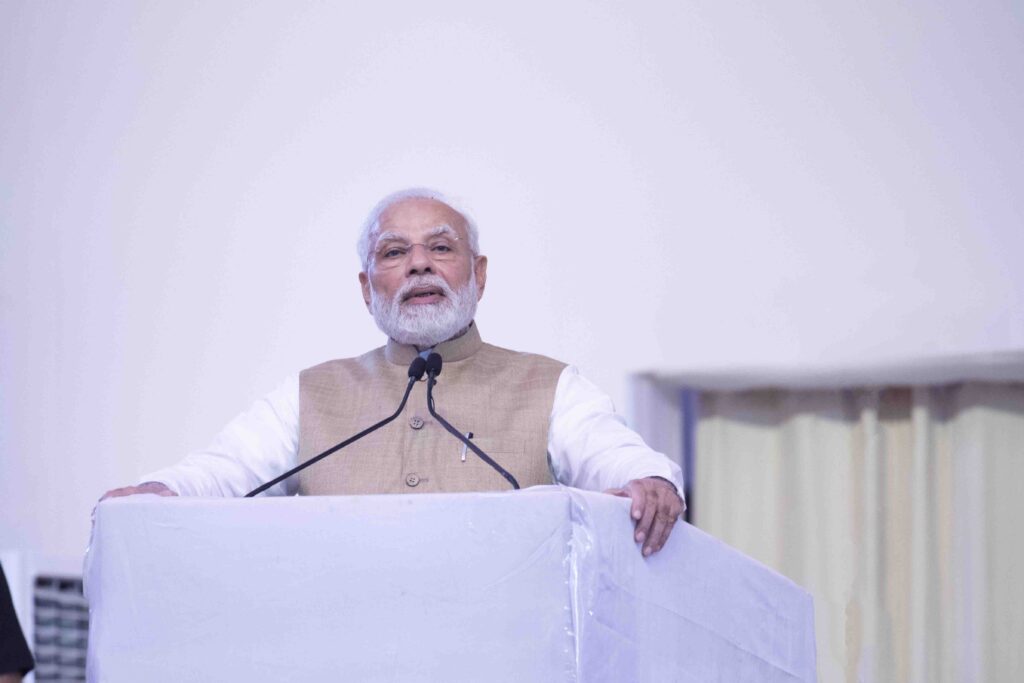Prime Minister of India, Shri Narendra Modi, inaugurated Amrita Hospital Faridabad today in the presence of world-renowned humanitarian and spiritual leader Sri Mata Amritanandamayi Devi (Amma). Also gracing the dais were the Hon’ble Governor of Haryana, Shri Bandaru Dattatreya; the Hon’ble Chief Minister of Haryana, Shri Manohar Lal; the Hon’ble Deputy Chief Minister of Haryana, Dushyant Chautala and the Minister of State for Power & Heavy Industries, Govt. of India, Shri Krishan Pal.
The inauguration was attended by hundreds of governmental and non-governmental dignitaries as well as medical professionals and educators from India and abroad. Thousands of citizens from Delhi and Faridabad and surrounding villages were in attendance, along with Amma’s devotees, who had come from all over the world to participate in the historic inauguration of India’s largest private hospital.

Upon arrival, the Hon’ble Prime Minister Shri Narendra Modi lighted a ceremonial lamp in the presence of Amma, Shri Bandaru Dattatreya and Shri Manohar Lal. Shri Narendra Modi and other dignitaries took a brief tour of the hospital’s state-of-the-art facilities, escorted by the Group Medical Director of Amrita Hospitals, Dr Prem Nair as well as Amrita Hospital Faridabad’s Medical and Administrative Directors, Dr Sanjeev Singh and Swami Nijamritananda Puri, respectively. Upon the tour’s conclusion, all proceeded to the pandal to address the assembled gathering of thousands of people and well-wishers.
The Prime Minister formally inaugurated the hospital by unveiling a plaque marking the momentous occasion. Speaking on the occasion, Shri Narendra Modi said: “As India is entering Amrit Kaal and collective aspirations and resolutions are taking shape, it is fitting that the country is getting the nectar of blessings of Sri Mata Amritanandamayi. This hospital is a blend of modernity and spirituality and will become a medium of accessible and affordable treatment for needy patients. It is incomparable from every aspect, be it the building and modern technology or the spirit of compassion and care. It is an amalgamation of spiritual consciousness and offerings of the modern world. The hospital will be a very effective medium of effective and accessible care for the poor.”
He added: “Amma is the embodiment of love, compassion, service, and sacrifice. She is the carrier of India’s spiritual traditions. I salute her for giving us the nectar of her blessings in the shape of Amrita Hospital at Faridabad. India is a nation where healing the sick is considered a sacred service, where health and spirituality are interconnected. Ancient Indians considered medical science as a Veda, or sacred knowledge. They gave the name of Ayurveda to medical science. India never allowed its spiritual and service traditions to go into oblivion even during the difficult period of slavery for centuries. It is good fortune of the nation that spiritual energy in the form of saints like Amma has always pervaded all corners of the country. The system of discharging the responsibilities of education and medicine by religious and social institutions was the PPP model of olden times. It is called Public-Private Partnership but I also see it as ‘Paraspar Prayas’ (mutual effort).”
The Prime Minister said: “When India developed a Covid vaccine, vicious propaganda was unleashed by some people and many kinds of rumours started spreading in the society. That is when religious leaders and spiritual gurus of the society came together and asked the people not to pay heed to these. The effect was immediate, and the country did not face the kind of vaccine hesitancy as was seen in other nations. From the ramparts of the Red Fort, I had placed a vision of the five vows of Amrit Kaal in front of the country. One of these was the complete renunciation of the mentality of slavery. When we give up this mindset, the direction of our actions also begins to change. This is today visible in the healthcare system of the country as there is growing faith in our traditional knowledge. Yoga and Ayurveda have global acceptance today, and the world is going to celebrate the International Millet Year next year.”
In her Benedictory Address to the people, Amma said, “Illness creates a state of desperate unhappiness. So, more than anyone, it is those suffering from illness who need our patient and loving care. Hospitals are their sole refuge, shelter, and sanctuary. As far as the patient is concerned, the doctor is God’s visible form because they are the ones who are able to give the patients some relief when they are in pain. Due to this, all those serving at the hospital—be it the doctors, nurses, or other employees—should always have a heartfelt smile on their lips. They should be people who can speak pleasant words. Their eyes, words and touch should be gentle and kind. They should be good listeners and must be able to work with patients bearing in mind their mental state.”
As Chancellor of Amrita Vishwa Vidyapeetham, Amma also encouraged interdisciplinary research among the top-ranked private university’s various schools and campuses, of which the Faridabad hospital will become the 8th campus. She said, “In our university Amrita Vishwa Vidyapeetham, there are many disciplines of study such as engineering, computing, biotechnology, nanotechnology, and medicine. All these disciplines have excellent research facilities. If all of them come together and conduct research in a multidisciplinary style, there is nothing that we cannot accomplish.”
Amma concluded by telling the thousands assembled, “Never waste any opportunity to serve. The entire world looks up to those who have the heart to do selfless service. We should not leave Mother Earth with scars. On the contrary, we should leave Mother Earth with flowers bedecked in her hair.”
Said the Hon’ble Chief Minister of Haryana, Shri Manohar Lal: “I am full of gratitude for Amma for choosing Faridabad for establishing the first-ever Amrita Hospital in North India and thank her on behalf of all the people of the state. I attended the foundation stone laying ceremony of the Hospital in 2016. The seed planted then has now grown into a huge tree and turned into one of the largest hospitals in the country. The Prime Minister has desired that every district in the country should have at least one medical college. Haryana is taking great strides in this. In 2014, there were 7 medical colleges in the state, with 700 MBBS seats. We added 6 more colleges and increased the seat count to 1,650. We are now going to establish 8 more medical colleges in the state, in addition to the one at Amrita Hospital, increasing the seat count to 2,800 in total. With this, every district in Haryana will have a medical college, fulfilling Prime Minster Modi’s vision. Under the Hon’ble Prime Minister’s leadership, India has successfully defeated Covid. Amrita Hospital will be hugely beneficial in case the country ever has to face such a formidable health challenge again. Amma has truly given her blessings to all of us for good health through this remarkable healthcare institution.”
The Welcome Address was given by Dr Sanjeev Singh, Resident Medical Director, Amrita Hospital, Faridabad.
With 2,600-beds, 534 of which are ICU, Amrita Hospital, Faridabad will be one of the largest hospitals in the country. It is to be equipped with 81 speciality departments (the highest in India), along with 64 state-of-the-art Operation Theatres and 10 bunkers for precision-medicine oncology, the first in India. Moreover, there will be a 150-seat, fully residential MBBS program, a Nursing College, and a College for Allied Health Sciences. The hospital hosts the largest, fully automated Smart Lab in the country for processing blood and other vital samples.
The hospital campus itself, which comprises 130 acres, is the largest green-building healthcare project in India, with a minimal carbon footprint and zero wastewater discharge. It will eventually be solar-powered. The total built-up area is more than 75 lakhs sq. ft, including 36 lakhs square sq. ft. of hospital buildings.
Amrita Hospital, Faridabad features cutting-edge technology in multiple speciality and super-speciality centres, including a heart institute, an institute for high-precision cancer diagnosis and therapy, solid-organ transplantation, an advanced centre for neurosciences and epilepsy, a Centre of Excellence of nephrology and urology, an institute for diabetes and metabolism, a centre for liver and biliary diseases, an institute for minimally invasive and robotic surgery, a centre for bone and joint diseases, an advanced centre for lung diseases, an institute for physical medicine and rehabilitation, a centre for spinal disorders, an advanced laboratory for molecular diagnostics, and an advanced centre for medical imaging and interventional radiology, among other centres.
The hospital is also putting a strong focus on mother-and-child healthcare. This will include a highly specialised multidisciplinary children’s hospital with maternal, reproductive, and foetal medicine and all paediatric subspecialities including paediatric cardiology, heart surgery and transplantation, rheumatology, endocrinology, pulmonology, neurosciences, paediatric genetics, gastroenterology, paediatric orthopaedics and paediatric and foetal surgery. This is a feature that most hospitals in India lack, as many private hospitals view maternal care as monetarily unsustainable.
The Amrita campus is unique in that it is building a three-lakh square-foot, most-advanced Research Block, which will comprise a Good Manufacturing Practises (GMP) Lab and focus on bioinformatics, genomics and proteomics, as well as integrated research. Currently, majority of updated technology-based simulation training takes place in the West. The Amrita campus houses a 1.5-lakh-square-foot Simulation Learning & Development Centre which will focus on high- and low-fidelity cadaver, microvascular and surgical simulation training involving robotics and haptics, spreading across all major specialties.
The hospital will also soon become a teaching hospital and thus, the eighth campus of Amrita Vishwa Vidyapeetham, which was ranked this year by NIRF as the fifth-best university in India (NAAC accreditation of A++), with its Medical College, based at Amrita Hospital, Kochi, Kerala being ranked as the eighth-best medical college in India. As a teaching hospital, Amrita will put a strong focus on research, aimed at developing innovative healthcare solutions and better treatment methods to help improve India’s healthcare landscape.
Amrita Hospital, Faridabad will serve not only the people of Faridabad and the State of Haryana, but also the entire population of Delhi-NCR and the adjoining states of UP, MP, Punjab, and Rajasthan, as well as other states in North and North-East India. It is expected to considerably reduce healthcare costs in the entire region, because it operates completely as a non-profit enterprise. Following the model of Amrita Hospital, Kochi, the Faridabad hospital has arrangements to provide free or inexpensive treatment in emergency cases to economically deprived patients.





No comment